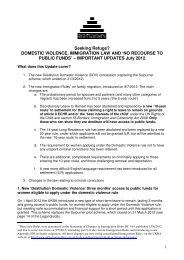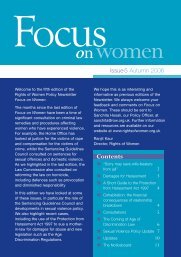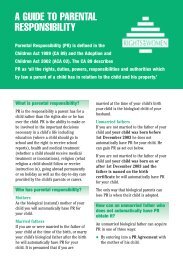Seeking Refuge? - Rights of Women
Seeking Refuge? - Rights of Women
Seeking Refuge? - Rights of Women
You also want an ePaper? Increase the reach of your titles
YUMPU automatically turns print PDFs into web optimized ePapers that Google loves.
• Article 8 Right to respect for private and<br />
family life: this article says that everyone has<br />
the right to respect for his or her private and<br />
family life, home and correspondence (sending<br />
or receiving letters). The article states that<br />
public authorities (for example, the UK Border<br />
Agency) can only interfere with these rights if<br />
they are allowed by law, and only where it is<br />
necessary for certain good reasons, like public<br />
safety or to maintain immigration control (the<br />
control <strong>of</strong> people who enter and remain in the<br />
UK).<br />
If you are successful in your claim under the<br />
ECHR, you may be given either<br />
Humanitarian Protection or<br />
Discretionary Leave.<br />
Who is entitled to Humanitarian<br />
Protection?<br />
You will be granted Humanitarian Protection if<br />
you do not qualify under the <strong>Refuge</strong>e Convention,<br />
but you have shown that there are substantial<br />
reasons for believing that:<br />
• if you were returned to your home country, you<br />
would face a real risk <strong>of</strong> suffering serious<br />
harm; and<br />
• your country is either unwilling or unable to<br />
protect you from this harm.<br />
Serious harm includes:<br />
• The death penalty or execution (for example,<br />
execution by the State because you have<br />
committed a serious crime).<br />
• Unlawful killing (for example, murder by a<br />
member <strong>of</strong> your family).<br />
• Torture, inhuman or degrading punishment.<br />
(Rape is considered to be a form <strong>of</strong> torture.<br />
Inhuman and degrading punishment is<br />
punishment that is harmful or humiliating, such<br />
as an assault. If the assault or beating is<br />
particularly severe it may be considered to be<br />
torture).<br />
• A serious and individual threat to you because<br />
<strong>of</strong> indiscriminate violence in a war or conflict<br />
(for example, where you are particularly at risk<br />
<strong>of</strong> being killed during a war).<br />
The concepts <strong>of</strong> internal flight and whether the<br />
State is able to <strong>of</strong>fer sufficient protection that<br />
apply when an application is made for <strong>Refuge</strong>e<br />
Leave (see above) also apply to applications for<br />
Humanitarian Protection.<br />
Who is entitled to Discretionary<br />
Leave?<br />
You will qualify for Discretionary Leave if you do<br />
not qualify for <strong>Refuge</strong>e Leave or Humanitarian<br />
Protection, but you can show that:<br />
• returning you would be a breach <strong>of</strong> your right<br />
to private and family life (Article 8 ECHR); or<br />
• returning you would be a breach <strong>of</strong> your right<br />
to be free from inhuman and degrading<br />
treatment (the second part <strong>of</strong> Article 3 ECHR).<br />
Whilst some <strong>of</strong> the rights in the ECHR are<br />
absolute (cannot be infringed in any<br />
circumstances), others can be interfered with or<br />
limited in certain circumstances. The right to<br />
private and family life is one <strong>of</strong> the rights that can<br />
be interfered with by public authorities, such as<br />
the UK Border Agency. However, in order for this<br />
interference to be lawful, it has to be<br />
proportionate and for a legitimate reason.<br />
Maintaining immigration control is considered to<br />
be a legitimate reason for interfering with your<br />
private and family life. Immigration control is the<br />
control <strong>of</strong> who is allowed to enter and remain in<br />
the UK from other countries. However, any<br />
interference has to be proportionate; this means<br />
that it has to be no more than is needed.<br />
Some rights in the ECHR are absolute; this<br />
means that they can never be limited. The<br />
right to be free from torture is an absolute<br />
right. This means that there are no<br />
circumstances when torture is allowed. Other<br />
rights can be interfered with in a way that is<br />
proportionate for a particular legitimate<br />
reason. A right is interfered with if it is<br />
limited or restricted in some way. Interference<br />
is proportionate if it is no more than is<br />
needed. A legitimate reason is one that is<br />
given in the ECHR, such as the maintenance <strong>of</strong><br />
immigration control.<br />
What is private and family life?<br />
Article 8 protects your right to a private life and<br />
your right to a life with your family.<br />
Your private life includes things like your work or<br />
studies and your privacy. You will have established<br />
private life when you have been settled for a<br />
significant amount <strong>of</strong> time in a country.<br />
17
















